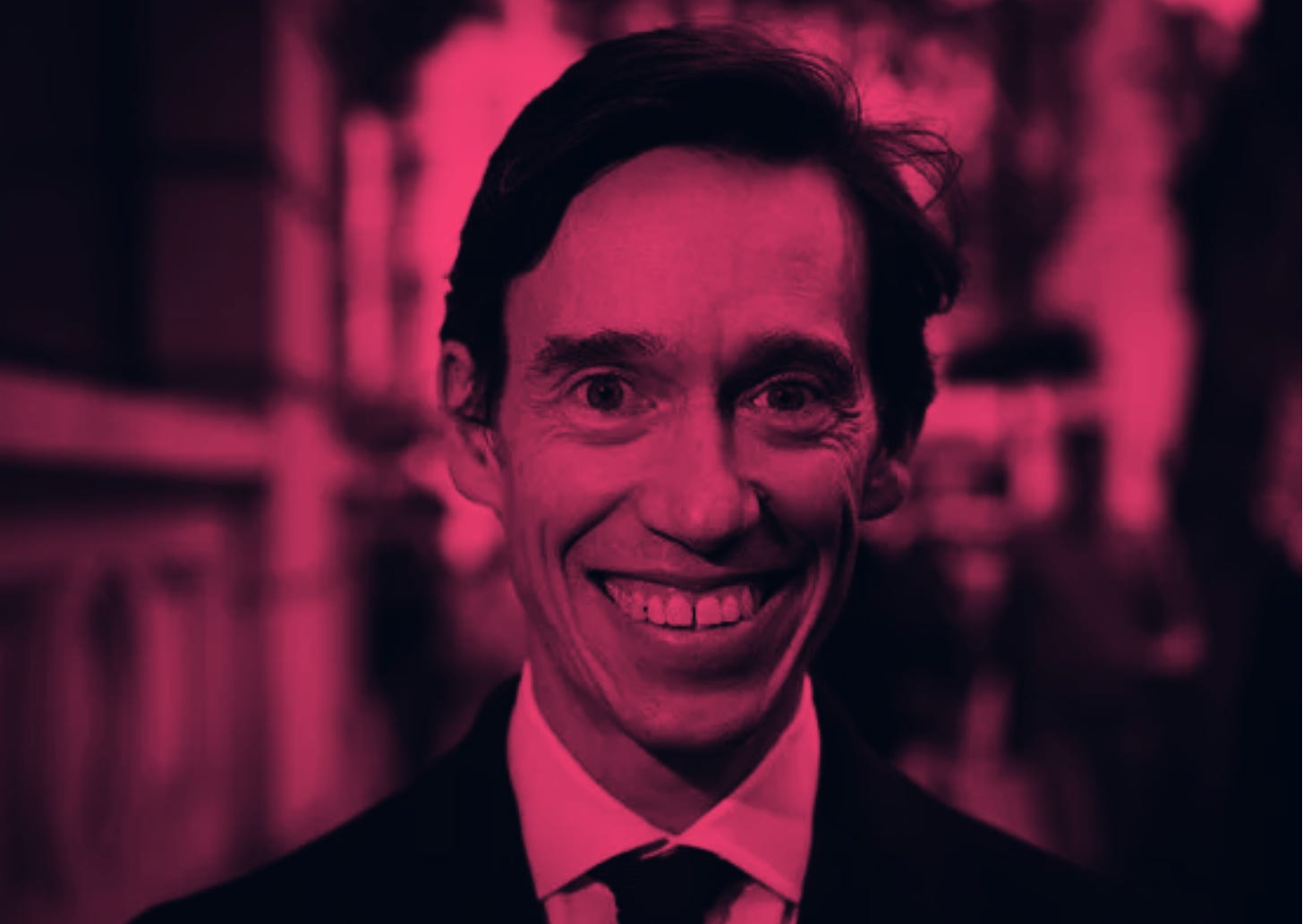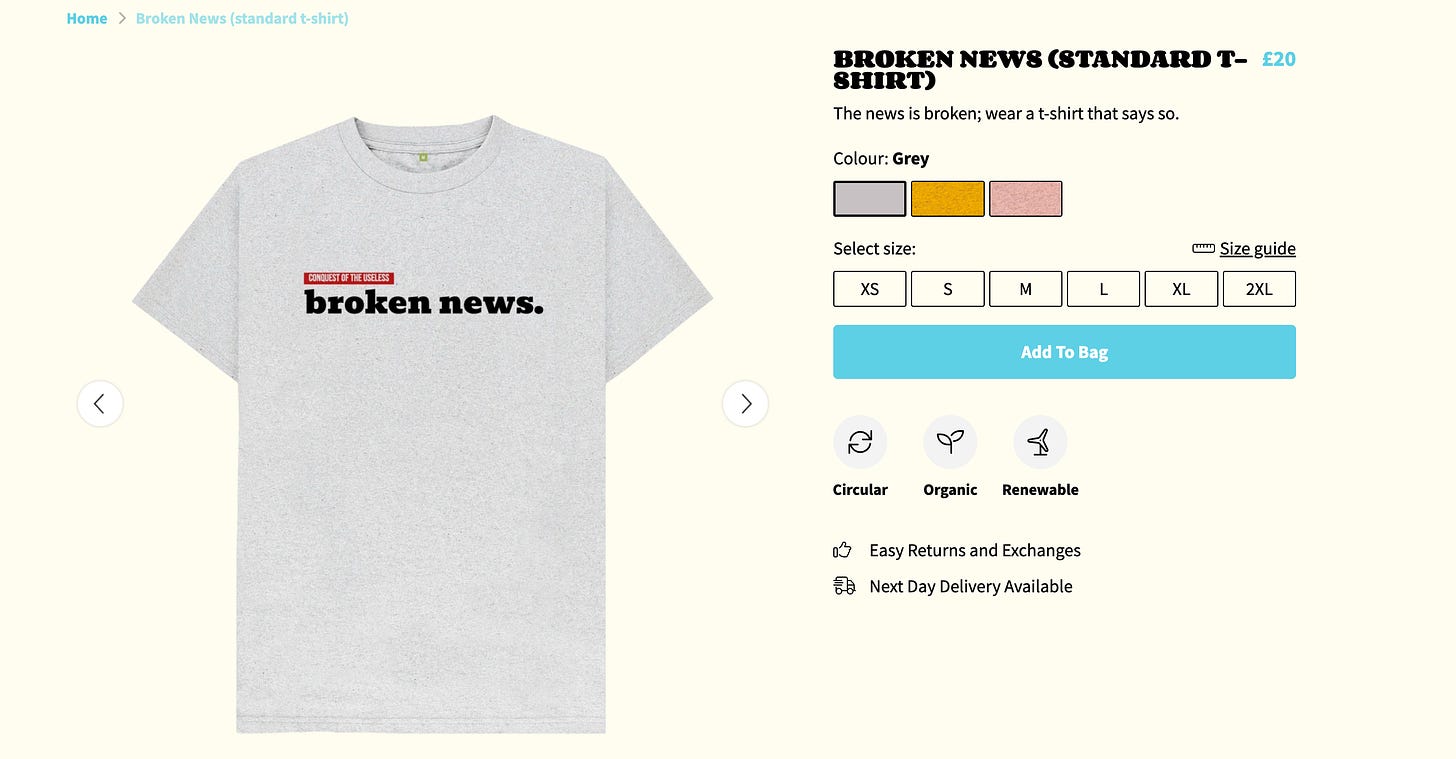Rashomon remade... with Rory Stewart
The scuffle between Janice Turner and Rory Stewart over the former's Times profile of the latter is a perfect example of how interviews are traps and interviewees are vain.
Previously: 10 things worth reading.
Former Tory MP, ex-minister, podcast co-host and definitely not former spook, Rory Stewart, has a book to promote. The vaingloriously titled Politics on the Edge covers Stewart’s selection as MP for Penrith and the Border, his time in parliament, the six ministerial jobs he held and his loss to Boris Johnson in a ludicrous leadership race. To promote it, he did an interview with The Times and, in retrospect, really didn’t enjoy it.
Talking to his podcast pal Alastair Campbell on their show The Rest Is Politics, he said:
I found myself out of the habit [of doing interviews] and I was reminded of how bizarre it feels to suddenly wake up to a whole series of WhatsApps from friends and former colleagues talking about an interview and then read it, and realise the way in which you’re being presented to the world. Quick context: Janice Turner, who’s a Times journalist, travelled to Jordan to interview me.. and on the basis of, I guess, she spent an hour and a half with me, produces a complete psychological analysis of me — of my daddy complexes, of my relationship with women… and I want to start with that and say, for you as a journalist, do you guys not feel, sometimes, that maybe spending an hour and a half with someone doesn’t qualify you to give a full psychological analysis of their character? Turner replied in a Twitter thread:
In his latest podcast, Rory Stewart criticises my Times interview. In particular, how I could make a “psychological assessment” of him based upon a 90 min encounter (actually 2.5 hours) at his home. He may have forgotten I read his new book, which is viscerally honest and therefore a uniquely fascinating political memoir.
But I also read his other books, listened to hours of podcasts, and read probably every interview he’s ever given. (He’s given A LOT). After it was published, friends of Rory messaged me saying it captured him, as did fellow MPs.
And I’m sorry Rory’s mother is apparently upset I portrayed her late husband / Rory’s father as a heavy drinker and smoker. But here is Rory in my transcript:
“Yes, and he wasn’t a young 60 either. He smoked a lot. He drank a lot.”
In other words, I did my job. I prepared extensively, thought hard about questions and quoted accurately. I was there to write a fair profile of an interesting, complex, and, perhaps, oversensitive man. Maybe I just don’t see Rory Stewart exactly as he sees himself. From listening to the episode in which Stewart ganches about the profile — bitchily expressing surprise that The Times should still have the budget to fly Turner out to meet him in Jordan — it’s clear that the headline was what triggered his avalanche of gripes about the encounter. It reads Rory Stewart on Alastair Campbell: ‘It could be a daddy thing’ and draws on the following section of the profile:
The pair have met only a few times and never had dinner together. Yet Stewart says he is genuinely fond of Campbell who, as a “big, tall, macho Scot”, reminds him of his father. So it’s a daddy thing? “It could be a daddy thing. I’m sure my ability to handle Alastair, insofar as I have, is trained by my ability to handle my grumpy father.” Although from different generations — Campbell is 66, Stewart 50 — they have interesting parallels. Both were expelled from their parties in 2019: Campbell for advocating voting Lib Dem, Stewart for opposing no-deal Brexit. Both are ardent Remainers and Boris-haters. Each has a gargantuan ego with a fissure of vulnerability.Turner set a bear trap with that question — “So it’s a daddy thing?” — and Stewart stumbled straight into it, repeating her words. One of the classic and most basic tenets of media training is this: Do not accept their framing. You don’t have to take the premise of the interviewer’s question at face value and you have to go into any interview with a plan. Why are you there? What do you want to achieve?
Later in the podcast, Stewart seems to have that epiphany:
I think the lesson I’ve taken from it sadly is that you can’t be naive and that you have to accept that these are artificial, structured things. You’re doing it for a reason and you’ve got to approach it quite cautiously, and not think that you can completely lay back and just chat in the way that you can to a friend. It’s a stupid thing to say, but the public should be aware of this… Frankly, he should already have known better and, if he didn’t, the PR team from Vintage, an imprint of Penguin Random House, should have prepared him. Turner has been at The Times for 20 years and is a sharp and dangerous interviewer. The idea of treating someone who has flown thousands of miles to profile you like “a friend” is — as Stewart says — stupid.
In the write-up of her 2013 interview with Rhys Ifans — an encounter described across the board as a “car crash” — Turner explained:
Actors are not my favourite interviewees. The game is you listen politely while they plug their film, bang on about their “method”, the brilliance of their co-stars and directors etc. Then in return you hope they will offer up — without you having to prod and pester like some celebrity stalker — the tiniest nugget of anecdote, a shard of light upon their real selves. Because they hate the game too, and particularly since it is mainly conducted in hotel suites, you feel as if you’re engaged in an odd form of prostitution, one where it remains unclear who is the hooker and who the john.Stewart is not an actor but he undoubtedly plays a character: the puppy-doggish polymath to Campbell’s pugnacious and faux jocular scrapper. If he, a man obsessed with The Great Game in Afghanistan as well as being very spook-adjacent, could not discern the intentions of a Times hack, that’s really his problem.
I’m no fan of Janice Turner — particularly her anti-trans writing — but she turned up to write a profile and did just that. Stewart is oversensitive, with a long history of giving quotes that make him look like a tit (when he isn’t dressing up in uniforms that make him look like a tit). Take this section from a 2010 New Yorker profile which suggested — no doubt to his enormous delight — that he may be a future Prime Minister:
Stewart reminded me that Lawrence, after his Arabian adventures, renounced celebrity, joining the Royal Air Force at the lowest rank, under a pseudonym: “He ends up with his ‘man’s work.’ He realized he can’t actually be a knight in shining armor.” Stewart added, “You can’t keep going. Look, Alexander’s dead at thirty-three, Byron’s dead at thirty-five, thirty-six. You can’t keep it up forever.” Although Stewart had just been elected to national office—and had just visited Chequers, the Prime Minister’s official country residence, to join a discussion about the future of Afghanistan—he argued that his general trajectory was away from the pursuit of power. In 2003 and 2004, he had helped govern parts of southern Iraq. Between 2005 and 2008, he ran the Turquoise Mountain Foundation, a charity, initiated by Prince Charles, that supports traditional arts in Afghanistan. He then entered academia. “Why would I run an arts school in Kabul?” he said. “It’s not part of the grand narrative. I don’t think Alexander the Great ran an arts school.” He considered for a moment that he had just compared himself to Alexander the Great, and laughed. “If you try to put it down in black and white, the irony vanishes and the monstrous egotism is revealed.”Where Turner does overstep the mark in the piece — and which Stewart can rightly complain about — is in writing this:
His avowed intent is to listen, learn and understand ordinary lives. Yet in person he is exceptionally awkward. I suspect he is uninterested in women: several female friends have sat next to him at dinners and he didn’t ask them a single question.Interviewers need to remember that being interviewed exacerbates awkwardness and that what you reckon about someone based on a short encounter — regardless of how much research you’ve done — is simply that: what you reckon. Perhaps Janice Turner’s friends are simply tedious, terrifying, or some horrible combination of the two.
I suspect the root of Stewart’s problem with this profile was not simply his eggshell ego but that since he was last interviewed frequently he’s become a podcast ‘star’ — The Rest Is Politics is a chart-topping, live-show sellout smash — and very used to being able to frame his arguments and personality himself in the safe space of his chats with Campbell. While their podcast purports to be based upon disagreements, they’re chums engaged in little more than a game of light and friendly slaps.
Turner did not turn up to be friends with Stewart. She went there to get “nuggets of anecdote” and he supplied them with bumptious self-confidence (“It could be a daddy thing…”). Still, as Campbell, reassured him on the podcast, the article ends with details of his new book and will do nothing to discourage his army of fans who remain convinced that this possible ex-spy who’s tremendous pals with the king is the one good Tory they’ve been desperately seeking.
Thanks for reading. X/Twitter is one of the main ways people find this newsletter so please consider sharing it there…
… and please also consider following me on Threads and TikTok if you’d like.
And consider upgrading to a paid subscription to this newsletter (you’ll get a bonus and I’ll be able to keep writing these newsletter editions):
House Ad:
You — well, possibly not you but some readers — requested t-shirts and now I have made some. Head here to see the selection.
For full transparency, I make between £2 and £4 on each item.





Nice one, Mic. It’s interesting how Stewart gripes about the framing and the artificial construct, when his entire media personality is one great artificial construct.
Good analysis. Newspaper interviews/profiles are rarely about fairness but at least Turner, for a Murdoch journalist, seems to have done a thorough job. Stewart is that rare oddity, a likeable Tory, and I recall he was voted best performer in that weird TV leadership debate when BoJo conned his way to the top. For me he deserves a morsel of credit for being the first Prisons Minister who took that
nightmare job at least half seriously. He was, of course, soon seen off by the pin-stripe thugs of the Tory right.